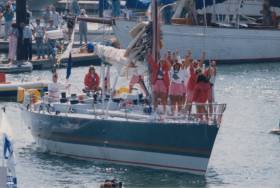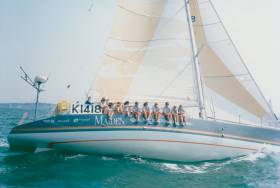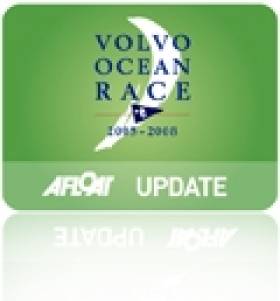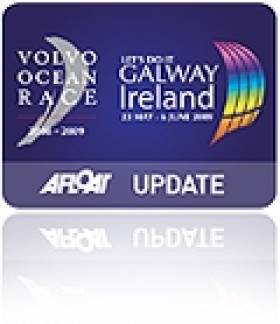Displaying items by tag: Whitbread Round the World Race
Tracy Edwards Documentary Set For Special Q&A Screening At Dublin’s IFI
The Irish Film Institute in Dublin joins the list of locations for a special screening of Alex Holmes’ Tracy Edwards documentary Maiden on Thursday 7 March.
As previously reported on Afloat.ie, Cork’s Gate Cinemas will also host the preview followed by a satellite link Q&A with Tracy Edwards and some special guests.
Edwards made history as the skipper of the first ever all-female crew to enter the Whitbread Round the World Race, which became the Volvo Ocean Race and is now simply The Ocean Race after its recent change of ownership.
Maiden opens at the IFI on Friday 8 March. Tickets are available for the special preview from 6pm on Thursday 7 March from the IFI box office.
Tracy Edwards Documentary To Have ‘Maiden’ Screening In Cork Next Month
Cork’s Gate Cinemas will stage a special screening of the new Tracy Edwards documentary Maiden, followed by a satellite link Q&A with Edwards herself, on Thursday 7 March.
Edwards was a 24-year-old cook on charter boats when in 1989 she became the skipper of the first ever all-female crew to enter the Whitbread Round the World Race, the precursor to the Volvo Ocean Race.
Maiden charts Edwards’ struggle against the odds — facing chauvinism in the yachting community, and rejection from sponsors — to put a team on the water.
Sailing a second-hand yacht financed by remortgaging her home, Edwards and her crew showed the world that women sailors were capable of doing everything their male counterparts could.
And their legacy can be seen more recently both in the all-woman Team SCA in the 2014-15 VOR, and the most recent edition that encouraged mixed crews. Indeed, Olympians Carolijn Brouwer and Marie Riou were part of the crew on the race-winning Dongfeng Race Team.
Maiden opens on Friday 8 March but tickets go on sale today (Friday 1 February) for the special preview screening in Cork the night before. Tickets go on sale today with details to follow.
Tributes Paid to Swedish Yachting Legend Magnus Olsson
#VOR - The sailing world has paid tribute to Volvo Ocean Race coach and round-the-world yachting legend Magnus Olsson, who has passed away from a stroke at the age of 64.
Olsson was a long-time veteran of the Volvo Ocean Race (VOR), beginning in 1985 when it was known as the Whitbread Round The World Race and last competing in the 2008-09 edition.
Most recently he was coaching the all-women Team SCA in their preparations for the 12th edition of the race starting this summer.
"It's with great sadness I received the news about Magnus passing away," said VOR chief Knut Frostad. "He was my mentor when I sailed around the world with him 20 years ago.
"He was the inspiration for me and for so many more and more than anything he was the smile of the race," he continued. "A true friend has left on his final leg and the sailing world will never be the same without Magnus and his smile. Never. My thoughts are with his two sons and his close family today."
Olsson - known to friends as 'Mange' - was born on 4 January 1949 and grew up near Stockholm. He began sailing on Lake Mälaren aged eight and learned his trade in OK Dinghy, Trapez and 505s, winning three Swedish national titles in the latter.
Before beginning his round-the-world career he also served as crew on Sverige in the 1976 America's Cup.
The Volvo Ocean Race website has further tributes from world sailing luminaries HERE.
VOR Skipper Cammas Receives French Sporting Honour
Volvo Ocean Race skipper Franck Cammas has been presented with one of France’s most prestigious sporting honours.
The man in charge of the Groupama sailing team was awarded the Grand Prix de l’Académie des Sports in Paris recently, recognising his achievements in sailing in 2010.
These included his skippering of the 100ft trimaran Groupama 3 non-stop around the world in a record-breaking in 48 days, 7 hours, 44 minutes and 52 seconds.
Cammas is only the fifth sailor to be presented with the award, following Whitbread Round the World Race skipper Eric Tabarly, 1983 America’s Cup winner John Bertrand, solo sailor Isabelle Autissier and Alinghi team principal Ernesto Bertarelli.
But Cammas isn't resting on his laurels, as he's currently preparing with his team to compete in the next Volvo Ocean Race kicking off next month.
He will lead a crew of 11 sailors - including Kerryman Damian Foxall - on the 70ft monohull Volvo Open 70 Groupama 4 in the 39,000 nautical mile race, which is set to conclude in Galway next summer and will also involve Wexford sailor Justin Slattery, who is in the crew for Team Abu Dhabi.
The action starts in Alicante, Spain on 29 October with the first in-port race. The first leg to Cape Town then begins on 5 November.
































































